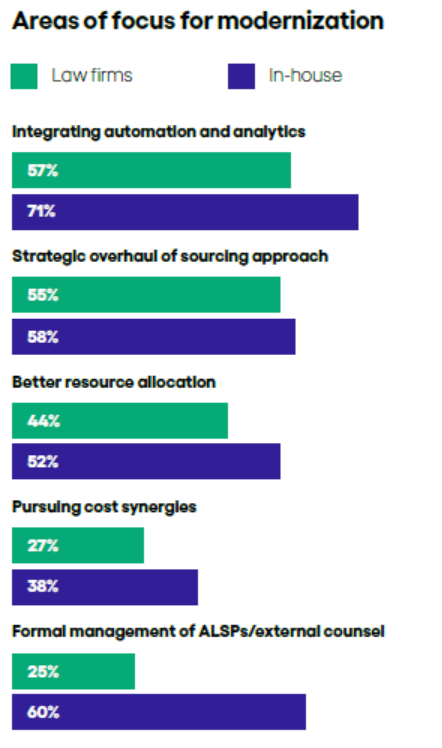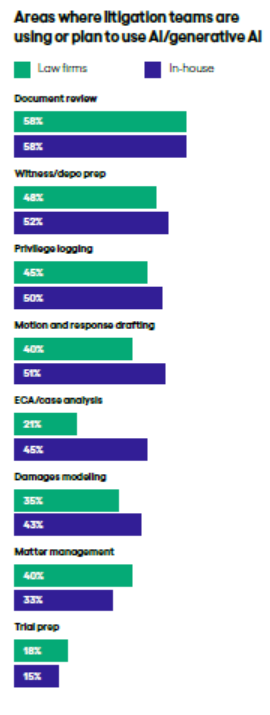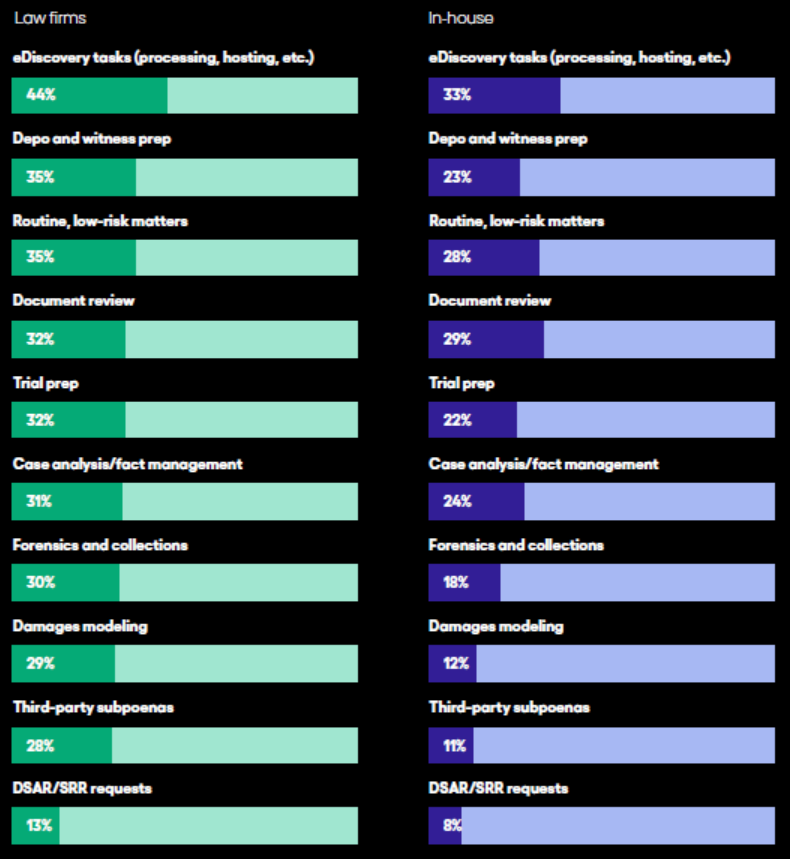2024 Litigation and AI Survey
Litigation directors must strike a balance between efficiency, clear budgets, and measurable results, while also managing increased volume and complexity. The sector is under increasing pressure to modernize and use cutting-edge techniques and technology for faster and more accurate results. In March 2024, UnitedLex commissioned a third-party study of over 200 top litigation professionals to understand the evolving trends and goals of the modern litigation function. Data and AI projects, performance metrics, and operational governance are driving a new paradigm for both in-house and law firm practitioners. This paper investigates how litigation professionals are addressing the obligation to modernize using AI tools.
Modernization Pressures
Most in-house teams and law firms prioritize modernizing their litigation practices during the next 12-18 months (92% and 84%, respectively) to better match budgets and resources and meet litigation priorities. Law firms and in-house teams embrace technology, particularly AI and generative AI, to accomplish their modernization goals. They are also shifting resources to better align with the expertise required in-house, such as AI, and outsourcing "run the business" litigation tasks so they can zero in on providing higher-value legal advice—all to measure the effectiveness of their litigation function using data-driven metrics.
Experimenting with Generative AI tools
AI, especially generative AI, has the potential to transform the legal process. Experimentation is crucial for identifying and implementing the most effective apps for litigation practitioners, preventing them from falling behind the competition. Recognizing the promise of increased productivity, the vast majority of in-house and law firm practitioners (74% and 62%, respectively) are currently using or plan to use AI/generative AI technologies for litigation work within the next year. Simultaneously, generative AI is altering not just how litigation work is completed, but also who performs the work within the legal ecosystem.
Resources are strategically reallocated due to constraints
Law firms and internal teams are being forced to resource work more efficiently due to tight budgets. This entails assigning work to the appropriate lawyers or outside providers and automating tedious procedures to save up internal staff time for higher-value cases. As a matter of fact, budgetary constraints are influencing how and for what purposes law firms and 82% of in-house respondents allocate their resources to litigation.
Assessing the success of modernization projects
Approximately 64% of in-house respondents stated that tracking budget against spend is the most crucial indicator for evaluating the success of their litigation function, whereas 68% of respondents from law firms stated billable hours, followed by profit per partner (56%) as the most crucial metrics. Continuous improvement is made possible by this data-driven strategy, guaranteeing that modernization initiatives result in more advantageous competitive positioning.
What's prompting the drive to integrate AI tools?
The major factor is that e-Discovery is becoming increasingly more complex, particularly because of the proliferation of online collaboration platforms like Asana and Slack as remote work has gotten popular, significantly ramping up the amount of electronic communication that could be relevant to a case. Litigation practitioners have essentially been flooded with an increasing volume of cases and a variety of data.
One way of dealing with the influx of work is more hiring, but that would only increase costs which are passed on to clients. The clients on the other hand are demanding that their legal practitioners handle cases as efficiently as possible. Whether that is cost efficiencies, work product optimization, or increased accuracy. If increased hiring isn’t a viable option, then using AI tools is the next best option.
Modernize or be left behind
Not only is the pressure to modernize coming from clients, but it's also coming from ‘from above’, i.e. leadership calling for legal departments to cut down costs. There is a prevailing view that if you are not embracing AI or more efficient ways of working, then those who do will have a competitive edge. And unfortunately, the data supports this. Either you modernize, or you get left behind, and it's typically the small firms with smaller budgets that get left behind.
What are the priorities?
If you are curious about the areas that in-house teams and law firms are focusing on, check out the image below. Generally, they are focusing on the same things, with integrating automation being a priority for both.

Too many options?
The major challenge that both law firms and in-house litigation teams face is navigating the sheer volume of new legaltech products hitting the market weekly and determining which one will address the problems they are facing. Every LegalTech company claims that they are the best, but it's more than just picking the best software, in the legal field it's not a one-size-fits-all.
Then comes the cost challenge. Really good AI software can cost upwards of $25,000 a year depending on the number of users you’ll have and what customizations you will have. A firm may also have to hire additional staff to manage the use of those products, or to develop additional products.
We can’t forget the training challenge. Most lawyers are busy with billable work and bogged down with administrative work and it may be difficult to find time and find lawyers who are receptive to learning new software. Lawyers by their nature can be risk and novelty-averse. Someone has to also foot the bill of the lawyers learning how to use the software and sure won't be the clients!
So, it's simply a large initial time and cost investment to innovate litigation practices which will result in great cost savings but firms, though willing, are struggling to make the initial leap! For instance, 74% of in-house respondents and 62% of law firm respondents in the UnitedLex survey said they are using or planning to use AI/generative AI for litigation-related work over the next 12 months. Document review tops the list for both.
Areas where litigation teams are using or planning to use AI/generative AI
If you guessed document review, then you guessed correctly. However, this is quickly changing as more and more firms are exploring the use of AI tools in areas such as drafting and summarizing briefs, motions, and case filings. The complete list is in the image below.

Build or buy?
Then there is the big debate of whether firms should build their custom applications that are built to their needs, or should they buy from an existing vendor an application that gets them about 85% of the way there. Unfortunately, the best software will cost a pretty penny and some firms wonder if it's not just cheaper to hire freelancers to develop their product or use their IT department to develop the product. There are pros and cons to either route, but I lean on the buy side. It's faster, cheaper, and already exists, so why not ask the vendor to make certain customization for you where the software falls short? The survey data also supports this. The majority of law firms and in-house litigation teams are accessing AI and GenAI tools through their ALSPs (66% and 64% respectively), rather than building or directly purchasing that technology.
Which tasks are AI tools performing?
You wouldn't be surprised to discover that both in-house teams and law firms are using ALSPs (Alternative Legal Service Providers) for routine eDiscovery and litigation tasks. I’ve attached the survey results below for your perusal.

So, what's the takeaway?
Law firms are going to be able to outsource routine litigation tasks to generative AI tools and therefore decrease the amount of administrative work they do. Most lawyers are focused on quickly allocating high-level tasks to higher-up attorneys and automating the mundane tasks so that they have more hours in the day to do more complex work for clients. The hope is that AI will carry out the following tasks, document review, eDiscovery tasks, routine low-risk matters, deposition and witness prep, and other areas. It's a journey and most practitioners are committed to learning and pivoting as necessary.


